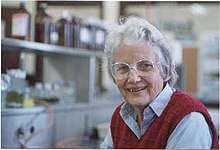Johanna Döbereiner
| Johanna Döbereiner | |
|---|---|
 | |
| Born |
28 November 1924 Ústí nad Labem, Czechoslovakia |
| Died |
5 October 2000 (aged 75) Seropédica, Brazil |
| Nationality |
|
| Awards |
UNESCO Science Prize (1989) Brazilian Order of Scientific Merit Premio México de Ciencia y Tecnología (1992) |
Johanna Liesbeth Kubelka Döbereiner (28 November 1924 – 5 October 2000) was a Brazilian agronomist. Her family were German Czechoslovakians who left the country after World War II. She received her degree from the Ludwig Maximilian University of Munich, but settled in Brazil and became a Brazilian citizen in 1956. Her early work includes studies of Azospirillum and other bacteria that could be useful to Brazilian soil.[1] She later played an important role in Brazil's soybean production by encouraging a reliance on varieties that solely depended on biological nitrogen fixation.[2]
References
- ↑ "History of discovery of N2-fixing organisms, UCLA" (PDF). Archived from the original (PDF) on July 9, 2010. Retrieved 2012-04-14.
- ↑ Baldani, J.I.; et al. "Johanna Döbereiner Memorial Lecture". In Finan, Turlough M.; et al. Nitrogen Fixation: Global Perspectives : Proceedings of the 13th International Congress on Nitrogen Fixation, Hamilton, Ontario, Canada, 2-7 July 2001. CABI Publishing. p. 3.
This article is issued from
Wikipedia.
The text is licensed under Creative Commons - Attribution - Sharealike.
Additional terms may apply for the media files.